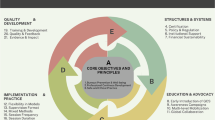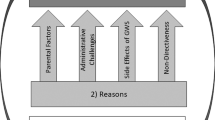Abstract
The objective of this article is to review guidelines that address counselling in the context of genetic testing in order to summarise what aspects of counselling they consider most important, and to examine how they construct the ideal of genetic counselling. Guidelines were collected by examining the websites of different international professional, political, ethical and patient organisations, either previously known or found with the help of the Google search engine, and also using references listed in other studies. The most frequently mentioned topics in the collected 56 guidelines were sought, and this was carried out with the software package Qualitative Solutions and Research for Non-numerical Unstructured Data Indexing Searching and Theorizing. Topics related to genetic counselling that were mentioned in at least 30 of 56 collected documents were considered to be the most important aspects of genetic counselling. The ideal of genetic counselling is expressed in the analysed guidelines as being composed of (1) an appropriately trained professional who understands genetics and its ethical implications well; (2) relevant and objective information; (3) assurance of the counsellee's understanding; (4) psychological support; (5) informed consent; (6) confidentiality of genetic information; (7) considering familial implications; (8) appropriate handling of potential discrimination of testing; and (9) assuring autonomous decision-making by the counsellee. The ideal of genetic counselling is rather consistent in the guidelines, but there are some contradictions between the requirements of objective information-giving and adapting counselling to counsellee's circumstances.
Similar content being viewed by others
Log in or create a free account to read this content
Gain free access to this article, as well as selected content from this journal and more on nature.com
or
References
Fraser FC : Genetic counselling. Am J Hum Genet 1974; 26: 639–659.
Harper PS : Practical Genetic Counselling. London: Wright, 1988.
Clarke AJ : The process of genetic counseling. Beyond non-directiveness; in Harper PS, Clarke AJ (eds): Genetics, Society and Clinical Practice. Oxford: BIOS Scientific Publishers, 1997, pp 179–200.
Weil J : Psychosocial genetic counseling in the post-nondirective era: a point of view. J Genet Couns 2003; 12: 199–211.
Borry P, Nys H, Goffing T, Dierickx K : Genetic Testing and Counselling. European Guidance, European Ethical-Legal Papers No 3, Leuven, 2007.
Barata PC, Gucciardi E, Ahmad F, Stewart DE : Cross-cultural perspectives on research participation and informed consent. Soc Sci Med 2006; 62: 479–490.
Alexander J : Patients' feelings about ward nursing regimes and involvement in rule construction. J Psychiatr Ment Health Nurs 2006; 13: 543–553.
Hueifang C, Shin-Ping T, Teh CZ et al: Lay beliefs about Hepatitis among North American Chinese: implications. J Community Health 2006; 31: 94–112.
de Wert G : Cascade screening. Whose information is it anyway? Eur J Hum Genet 2005; 13: 397–398.
Elwyn G, Gray J, Clarke A : Shared decision making and non-directiveness in genetic counselling. J Med Genet 2000; 37: 135–138.
Petersen A : Counselling the genetically ‘at risk’: the poetics and politics of ‘non-directiveness’. Health, Risk Soc 1999; 3: 253–265.
Petersen A : The new genetics and the politics of public health. Crit Public Health 1998; 8: 59–71.
Kerr A, Shakespeare T : Genetic Politics. From Eugenics to Genome. Cheltenham: New Clarion Press, 2002.
Shiloh S : Decision-making in the context of genetic risk; in Marteau T, Richards M (eds): The Troubled Helix. Social and Psychological Implications of the New Human Genetics. Cambridge: Cambridge University Press, 1996, pp 82–103.
Charles C, Gafni A, Whelan T : Shared decision-making in the medical encounter: what does it mean? (Or it takes at least two to tango). Soc Sci Med 1997; 5: 681–692.
Decruyenaere M, Evers-Kiebooms G, Denayer L et al: Predictive testing for hereditary breast and ovarian cancer: a psychological framework for pre-test counselling. Eur J Hum Genet 2000; 8: 130–136.
Kessler S : Psychological aspects of genetic counseling. XI. Nondirectiveness revisited. Am J Med Genet 1997; 72: 164–171.
Weil J, Ormond K, Peters J, Peters K, Bowles BB, LeRoy B : The relationship of nondirectiveness to genetic counseling: report of a workshop at the 2003 NSGC annual education conference. J Genet Couns 2006; 15: 85–93.
Davison C : Predictive genetics: the cultural implications of supplying probable futures; in Marteau T, Richards M (eds): The Troubled Helix. Social and Psychological Implications of the New Human Genetics. Cambridge: Cambridge University Press, 1996, pp 317–330.
Harper PS : What do we mean by genetic testing? J Med Genet 1997; 34: 749–752.
Acknowledgements
This work was supported by EuroGentest, an EU-FP6 supported NoE contract number 512148. ER thanks her supervisors Harri Melin and Seppo Pöntinen at the Department of Sociology, University of Turku, Finland.
Author information
Authors and Affiliations
Corresponding author
Additional information
Supplementary Information accompanies the paper on European Journal of Human Genetics website (http://www.nature.com/ejhg)
Rights and permissions
About this article
Cite this article
Rantanen, E., Hietala, M., Kristoffersson, U. et al. What is ideal genetic counselling? A survey of current international guidelines. Eur J Hum Genet 16, 445–452 (2008). https://doi.org/10.1038/sj.ejhg.5201983
Received:
Revised:
Accepted:
Published:
Issue date:
DOI: https://doi.org/10.1038/sj.ejhg.5201983
Keywords
This article is cited by
-
The role of the Genetic Counsellor in the multidisciplinary team: the perception of geneticists in Europe
European Journal of Human Genetics (2022)
-
Recommendations for neonatologists and pediatricians working in first level birthing centers on the first communication of genetic disease and malformation syndrome diagnosis: consensus issued by 6 Italian scientific societies and 4 parents’ associations
Italian Journal of Pediatrics (2021)
-
Challenges to effective and autonomous genetic testing and counseling for ethno-cultural minorities: a qualitative study
BMC Medical Ethics (2020)
-
Medicine, market and communication: ethical considerations in regard to persuasive communication in direct-to-consumer genetic testing services
BMC Medical Ethics (2018)
-
Training Genetic Counsellors to Deliver an Innovative Therapeutic Intervention: their Views and Experience of Facilitating Multi‐Family Discussion Groups
Journal of Genetic Counseling (2017)



